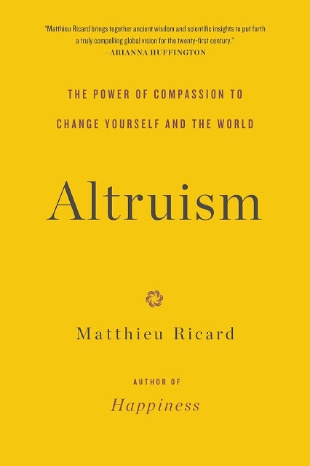Matthieu Ricard is a Renaissance genius and bridge-builder with a seemingly endless supply of energy and enthusiasm. His talent overflows into many fields of interest including science, Tibetan Buddhism, mindfulness, and compassion. His last book Happiness: A Guide to Developing Life's Most Important Skill was a bestseller; the TED Talk about it been viewed by over seven million people. Ricard is an active participant in the current research on the effects of meditation on the brain. He lives in Nepal and devotes much of his time to humanitarian projects in Tibet, India, and Nepal.
This paperback version of his 849-page tome is very ambitious in its sweeping purview of the impact of altruism on our times. Ricard quotes Alexander Jolllien: "Altruism is like rings in the water when you toss a pebble. At first they are very small, then they get larger, and finally they embrace the entire surface of the ocean." He adds to this: "Altruism and compassion have the aim of spreading themselves as widely as possible. We must simply understand that our own well-being and the world's cannot rest on indifference to the happiness of the other or on a refusal to care about the sufferings around us."
There are many ways to approach altruism: some see it as a motivation; others as a momentary state of mind that aims at accomplishing the good others; and last but not least, others regard it as a way of being in the world. Ricard goes further by stating that altruism is not given only to action and does not require sacrifice.
This character quality has two faces: Loving-kindness and compassion. Empathy "catalyzes the transformation of altruistic love into compassion." In this context of assessing emotions, the author devotes an entire chapter to Barbara Frederickson, a pioneer of positive psychology which declares love to be the supreme emotion, something that should be cultivated every day.
Ricard takes his hat off to those who demonstrate altruistic heroism and to the goodness that enables some to see human beings as members of the same family.
With a gathering intensity, the author adds new rings in the water as he plunges into the philosophical arguments against universal selfishness. He discusses evolution, maternal love, prosocial behavior among animals and children, the spread of individualism and narcissism, the engines of war, fighting inequality, and ways to create a caring economy and sustainable harmony.
"It is not because things are difficult that we do not dare; it is because we do not dare that things are difficult." This thought-piece quotation by Seneca leads Ricard into his last flourish where he praises the intertwining of altruism and happiness. And, then the final thought:
"It is love that is always available, and that stems from the unchanging simplicity, serenity, and strength of a good heart."
